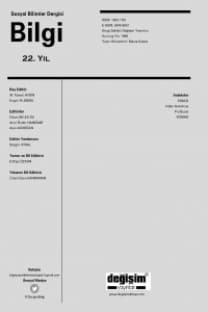Yeni Çağın Yeni Dinî Formları Karşısında İslâmcılık
Bu makalede, özellikle 1980’lerden sonraki dönemde tasavvufun Müslümanların gündelik hayatında yükselişe geçmesiyle birlikte modern(ist) bir hareket olan İslâmcılığın karşısında oluşan yeni dinî konum ve gelişmeler ele alınmıştır. Bu süreç alışılagelmiş geleneksel formlarıyla tasavvufun ve tasavvufî grupların canlanmasından ziyade, postmodernizm, popüler kültür ve küreselleşmeden oluşan üç boyutlu bir yapıda İslâm ve müslümanlık algılarının dönüşümünü içermektedir. Bu çalışmada söz konusu süreç modern(ist) İslâmcılığın karşısında yükselen postmodern(ist) yeni dinî formların ortaya çıkışı olarak felsefî, kültürel ve politik boyutlarıyla incelenmektedir. Sonuç olarak, bu yeni dinî formların geleneksel anlamda İslâmî bir öze dönüş hareketi değil, modern(ist) İslâmcılığın karşısında yükselen postmodern(ist) bir ideolojik duruş olarak tanımlanabileceği iddia edilmektedir.
Anahtar Kelimeler:
İslâmcılık, Tasavvuf, Sekülerleşme, Postmodernizm, Yeni Çağ
Islamism and New Religious Forms in the New Age
In this article, the formation of new religious positions and developments against the modern(ist) islamism with the rise of tasawwuf in the daily life of muslims especially in the period after 1980s is examined. This process involves the transformation of the perceptions of islam and muslimhood on a tridimensional structure based on postmodernism, popular culture and globalization rather than a revival of tasawwuf and sufi groups in its accustomed traditional forms. In this study, the process in question is examined with its philosophical, cultural and political dimensions as the formation of rising new postmodern(ist) religious forms against modern(ist) Islamism. In conclusion, it is argued that these new religious forms can be portrayed as a postmodern(ist) ideological position against modern(ist) islamism rather than a movement of a return to islamic essence in traditional meaning.
Keywords:
Islamism, Tasawwuf, Secularization, Postmodernism, New Age,
- ISSN: 1302-1761
- Yayın Aralığı: Yılda 2 Sayı
- Başlangıç: 1999
- Yayıncı: Değişim Yayınları
Sayıdaki Diğer Makaleler
The struggle over power between Islamism and the state; re-reading “Between State and Islam”
Yeni Çağın Yeni Dinî Formları Karşısında İslâmcılık
AK Parti’nin ‘Keşkeci’ Okumasının İçkin Eleştirisi
Finansal Krizler Üzerine Bir Değerlendirme
İslamcılığın Dönüşümünü Tartışmak: İslamcılığın Dört Hali ve Muhafazakârlaşmak
‘İnsana Yakışır İş’ Bağlamında Türkiye İşgücü Piyasasında Kadınların Durumu
Emel ÇETİNKAYA, Sinem YILDIRIMALP
İslami Özcülüğün Üç Ayrı Görüntüsü: Klasik, Kültürel ve Yeni-Özcüler
Tarihsel Sorumluluk ve Siyasal Değişim Beklentisi Arasında Suriye Müslüman Kardeşler Örgütü
